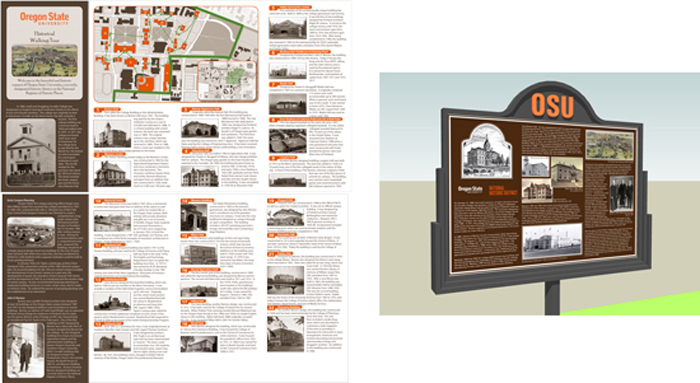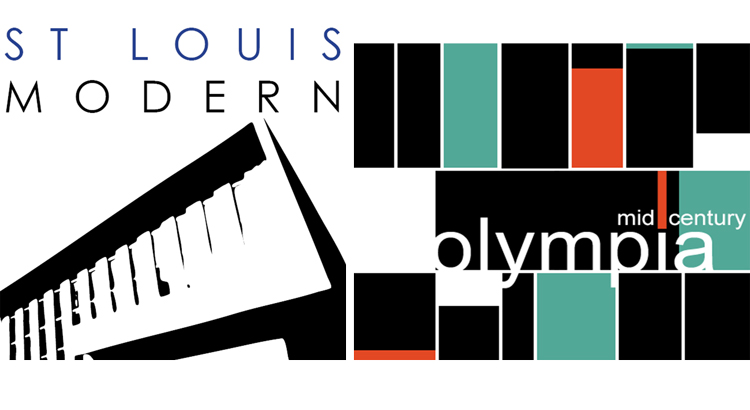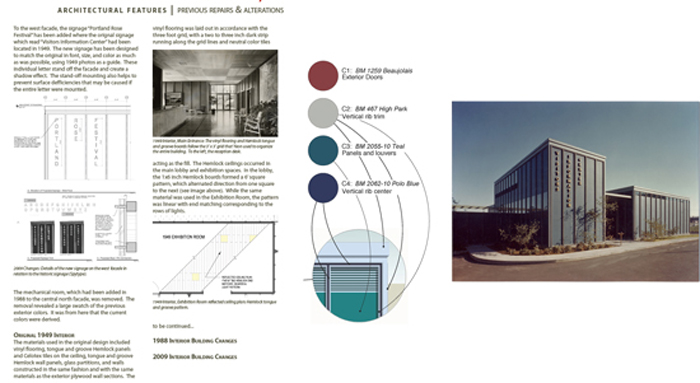Graphic design is a communication tool that plays an important role in architectural design. At its most fundamental level, graphic design visually communicates information with typography, color, and form. It also, and perhaps more importantly, influences our interaction with and the identity of place and space. From way-finding signage, supergraphics, branding, material and texture, to motion-graphics, graphic design helps integrate word and content with architecture.
Graphic design is used to visually communicate and reinforce the sense of identity for architectural projects – including both new design, renovation, and planning projects. From logo design, visitor orientation and infographics, graphic design is an integral part to the sense of place. It affects the overall experience with the visitor, public, or inhabitant. It is also dependent on the architectural design. Think of the range of materials and its finishes used through-out a building. Graphic design must be intentional, otherwise chaos results in color, type, and form within the design struggling against the architectural design, materials and texture.

PMA has had the pleasure of incorporating graphic design into projects. The most notable projects have included graphic design for way-finding signage and project branding. For Oregon State University (OSU) PMA created a campus-wide Historic Preservation Plan which included a Historic District, and the design of historic district signage, interpretive panels, and a campus walking tour brochure. We use way-finding signage daily to quickly distinguish different spatial areas, direction, and to distinguish landmarks. The way-finding signage produced for OSU was created to distinguish the campuses Historic District from other campus areas, which included a walking tour of its historically significant campus buildings. Color was utilized as the mnemonic devise to distinguish the Historic District, while also seamlessly integrating with existing OSU colors.
 PMA has been involved with several architectural planning projects that center on significant structures from the Mid-Century Modern era. These projects surveyed and documented hundreds of architecturally significant structures that revolutionized architecture and design throughout the 20th century. On the surface such planning projects can be difficult for a wide audience to understand and appreciate because the final project is not a new or renovated building(s). What better opportunity then, for graphic design to communicate and connect the significance of the project and its structures. For these projects, project logos and marketing collateral were designed as the visual symbols that communicate the entire identity of the projects. While both projects surveyed Mid-Century structures one focused on residential structures while the other did not. Both logos use form with text and color to help shape the sense of which type of mid-century modern structures were surveyed.
PMA has been involved with several architectural planning projects that center on significant structures from the Mid-Century Modern era. These projects surveyed and documented hundreds of architecturally significant structures that revolutionized architecture and design throughout the 20th century. On the surface such planning projects can be difficult for a wide audience to understand and appreciate because the final project is not a new or renovated building(s). What better opportunity then, for graphic design to communicate and connect the significance of the project and its structures. For these projects, project logos and marketing collateral were designed as the visual symbols that communicate the entire identity of the projects. While both projects surveyed Mid-Century structures one focused on residential structures while the other did not. Both logos use form with text and color to help shape the sense of which type of mid-century modern structures were surveyed.
 Following our planning projects centered on Mid-Century Modern architecture, PMA provided graphic design services for the renovation of the John Yeon designed Rose Festival Headquarters building (former Visitors Information Center). For this project, typography and color were the focal points for communicating the next chapter in this buildings life-cycle. The new graphics, color, and signage produced pay homage to the original design, while being entirely their own.
Following our planning projects centered on Mid-Century Modern architecture, PMA provided graphic design services for the renovation of the John Yeon designed Rose Festival Headquarters building (former Visitors Information Center). For this project, typography and color were the focal points for communicating the next chapter in this buildings life-cycle. The new graphics, color, and signage produced pay homage to the original design, while being entirely their own.
Graphic design is an essential component to architectural design. It is a visual communication tool that utilizes typography, color, and form as a way to influence our interaction with and provide a sense of identity of place and space. Graphic design can solve important issues such as spatial orientation within a space, or by using graphic tools to communicate story-telling and identity. For a more in-depth look at our projects incorporating graphic design, please visit our OSU and STL Modern project pages.
Written by Kate Kearney, Marketing Coordinator

your article is for the novice graphic designer. Thanks for sharing the informative post.